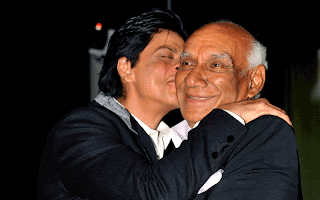He worked with Ashok Kumar to Shah Rukh Khan and Mala Sinha to Anushka Sharma in his over five-decade glorious cinematic journey, and the title of Yash Chopra's new film, "Jab Tak Hai Jaan", summed up the ace filmmaker's philosophy - making path-breaking movies till he could.
His death Sunday came weeks before the release of "Jab Tak Hai Jaan", which he had announced would be his last directorial venture. The romantic saga is coming out Nov 13, but he will not be around to see it.
Chopra, who turned 80 Sep 27, was born in Lahore in 1932 and eventually came to Mumbai after Partition. In an interview some days before he was hospitalised with dengue, Chopra told Shah Rukh: "My mother said do what your heart says. She gave me Rs.200 and said my blessings are with you. Go ahead and don't worry."
He also said whatever he was because of his late brother and filmmaker B.R. Chopra, whom he assisted at the beginning of his Bollywood career.
"I'm sitting here just because of B.R. Chopra and no one else. I wanted to fly on my own wings," he said in that interview.
He admitted that it was not easy to start Yash Raj Films, his production house that has been delivering blockbuster hits, in 1971.
Yet, Chopra was one of the few directors to make two superhit films simultaneously - action drama "Deewar" (1975) and cross-generational romance "Kabhi Kabhie" (1976) - both proved his versatility and his hold on the pulse of audiences.
But, like all legendary directors, no one or two films can sum up Chopra's achievements.
To the world, Chopra was known as the 'King of Romance', a well-deserved title after he created memorable love stories in "Daag", "Kabhi Kabhie", "Silsila", "Chandni", "Dil To Pagal Hai", and "Veer Zaara". To keep up with evolving audiences, he adapted new trends in each era and made most glamorous and trendy romances.
Like others, he too went through a bad patch after two of his films - "Faasle" (1985) and "Vijay" (1988) - bombed one after the other at the box office.
But after facing the setbacks, Chopra triumphed again at the box office with "Chandni".
"When I was making 'Vijay', I was making films just to be successful and not from my heart and I knew I was making the wrong kind of films. I decided to make a hardcore romantic film with nine songs and this is how I thought of 'Chandni' (1989)," he had said in an interview once.
He went on to create a new-age romance for Gen Y with "Dil To Pagal Hai" (1997), a sleek, urban, musical romantic saga that reaped gold at the box office.
Then he made the cross-border romantic flick "Veer Zara" (2004) and was planing to hang up his boots after "Jab Tak Hai Jaan".
In his career, he won many awards, including the prestigious Dadasaheb Phalke Award in 2001, six National Awards, 11 Filmfare Awards and was conferred the Padma Bhushan in 2005.
Many of Chopra's romances used the beautiful alpine landscape of Switzerland. Chopra shot so many times in Switzerland that a lake in the Alpenrausch, a favourite shooting spot of his, has been christened Chopra Lake.
Not only that, he became the first recipient of the title of Ambassador of Interlaken, and a special Yash Chopra Suite and Yash Chopra Train were inaugurated in his honour in Interlaken in 2011.
But Chopra's oeuvre was not limited to just romance and relationships. In his five decade-long career, he experimented with all genres.
His first film "Dhool Ka Phool" in 1959 was the story of an illegitimate Hindu child being brought up by a Muslim.
His next project, "Dharamputra" (1961) was another hard-hitting film on communal conflict, and was one of the first films to depict the Partition and Hindu fundamentalism. The film marked the debut of Shashi Kapoor in a full-fledged role and won the National Award for Best Feature Film in Hindi.
A precedent-setter, Chopra's 1965 critically successful drama "Waqt" pioneered the concept of multi-starters in Bollywood, while "Ittefaq" (1969) was a taut thriller, being the first Hindi films which did not have any songs or an interval.
Proving his versatility, Chopra on one hand directed intense dramas "Deewar", "Trishul", and "Mashaal", while on the other he made family sagas like "Parampara" and thrillers - "Kala Patthar" and "Darr".
His movies were sometimes based on real life tragedies. The Dec 27, 1975, accident in a coal mine in Chasnala near Dhanbad inspired the multi-starrer intense drama, "Kaala Patthar" starring Amitabh Bachchan, Shatrughan Sinha and Shashi Kapoor.
Chopra was one of the few filmmakers who created a cult following for his actors -- Amitabh Bachchan, Sridevi and Shah Rukh Khan - and gave audiences evergreen songs.


No comments:
Post a Comment